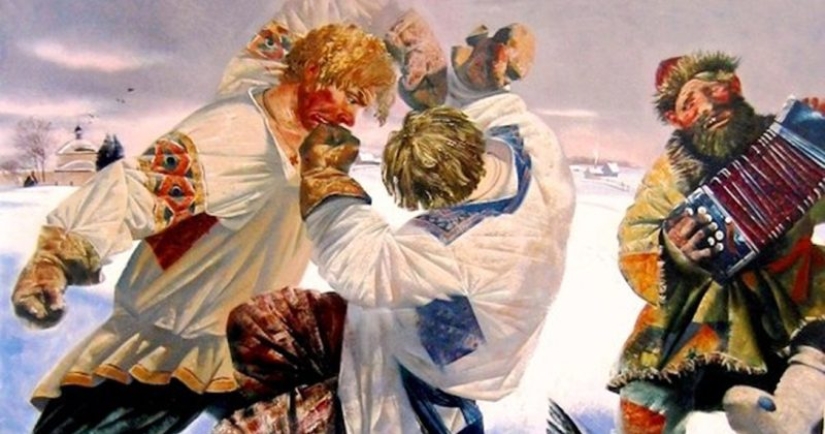In captivity stereotypes, or How foreigners see Russian
Categories: Nations
By Pictolic https://pictolic.com/article/in-captivity-stereotypes-or-how-foreigners-see-russian.htmlThe list of myths about the Russian, who wander through the world, is huge. The Communists, bears, balalaika, samovar and innovative features for a very long time to pursue the Russians, wherever we went. To understand why there are stereotypes and what they are based, the journalists of the newspaper "AIF" met with expert ethnographer, doctor of historical Sciences, Professor Isabella Shangin.

Chief researcher of the Department of Ethnography of the Russian people, the Russian Museum of Ethnography, Isabella I. Shangina is the author of more than 200 publications on the life and culture of the Russian. Who else but it can shed light on what is more in us — laziness, warmth or patience.
 It is well known that the Russian people know how to laugh and have fun, so much so that others can envy. Even in pagan times, it was believed that laughter is an important sign of life, inhabited by people of a place. "Laugh — so live!" — said our ancestors in ancient times.
It is well known that the Russian people know how to laugh and have fun, so much so that others can envy. Even in pagan times, it was believed that laughter is an important sign of life, inhabited by people of a place. "Laugh — so live!" — said our ancestors in ancient times.
Another well — known saying - "Laughter without a reason is a sign fool," appeared later, under the direct influence of the Orthodox Church. The founding fathers of the clergy insisted that laughter and joy is a sin. They liked to cite the passage from the gospel of Luke, which said: "Woe unto you that laugh now! Ye shall mourn and weep".
But the smile still remained important thing for a Russian. The one to whom it is addressed, you may be sure that he is pleasant, thanks to a love only friends and loved ones. Smile everyone in Russia was not accepted and it was even considered a sign of stupidity.

Russian long been found containing alcohol drinks. Braga, honey, beer, and vodka later and were frequent guests at the table. But to abuse alcohol on ordinary days was not accepted and to have a good drink waiting for the holiday. Excessive love drinks at all times is not encouraged, therefore, to the person who drank on weekdays were unimportant.
In fairness it should be noted that happened in Russia and years of rampant alcoholism. Usually it was a difficult time when many wanted just to escape from harsh reality. An example of such a period — the time of Troubles of the early XVII century, when natural disasters superimposed on war and popular uprising. After the crisis, when everything falls into place, drinking stops.The myth of rampant alcoholism Russian based on the fact that we drink is not for the mood, but as the Gentiles to enlightenment, becoming one with the deity, in whose honour a festival was held. You must achieve the sacred denial of reality in order to reach heavenly bliss.

The myth that all Russian loafers and not able to work created in the XVI—XVII centuries. ecah of foreign visitors. They added, however, that Russia is a country prosperous and very rich. In fact, the work has always meant a lot for the Russian people.
"Not to work — and the bread is not to achieve a", "Man is born to labor, No labor no good" and other old sayings confirm that the creation was and is the basis of life of the Russian people. Laziness has always been considered one of the most serious defects and strongly censured and derided.
The idea of Russian as a nation of lazy, foreigners have formed due to the fact that they knew Russian life is too superficial. Lived overseas visitors in the large cities and therefore could not see farm labor.The main work in Russia accounted for the summer period, which is shorter than in most European countries. To 3-4 months to grow up in a not so good soils, abundant harvest, which would be enough for the whole year, it was hard work. Winter, which lasted almost 6 months, was a time of relative rest.
Mislead foreigners and a large number of holidays when work was impossible. In their year was 170, not counting Sundays. In those days, was supposed to communicate with God and the majority of everyday peasant and artisan Affairs was banned.
In everyday life, Russians really very tolerant of different problems and issues. It is believed that if not to complain, and sooner or later it will all work out and be okay. This philosophical attitude came to us together with the Orthodox Church, which teaches humility and believes patience is one of the most important human virtues: "God is patient and told us."
Talking about his hard life, older people say, "What can you do — it just happened that way". Someone died in the war close, someone lost a house or forced to live with relatives drinkers — people living with it and not want to rebel against the destiny of the villain.

In Russia sincerity are very highly regarded and is considered one of the most important aspects of values. It is important that between feelings to the man, and addressed him with words, not contradictions at all. If such discrepancies notice, then a person is considered hypocritical, dishonest and devoid of dignity.
Sympathy for the people caught in a difficult life situation, that is kindness, in the scale of values of the population of Russia is the most important thing. The compassion and desire to help someone who was in trouble, mercy to the prisoners and defeated enemy — all signs of the Russian wide and good soul.
In Russia, unlike in many other countries, is highly regarded talk "heart to heart", in which people divided sore, and often regretted some of his actions. This practice is associated with Christianity, or rather with the tradition of the Church penance. This "outpouring of the soul" relieves mental anguish, relieves pain and helps to restore inner harmony.In our days, when we go to confession a few people talk about their problems to friends, relatives and random passengers. An outsider can tell more than close, as the chances of meeting him is very small, and the same people do not exist.
In Europe, in this case, it can just say: "I was tired of listening to it", and we sincerely think: "Man wants to speak. Why doesn't he help?". The ability to listen to the interlocutor, not to judge and maintain the good word is a very important benefit of the Russian people.

This is not true. Russian people has to centuries-old rules of behavior different from what is accepted as the norm in other countries. You need to be objective — abroad Russian really stand out is often not the best manners. They can be rude to the hotel staff, not to say Hello to neighbors and say why this is so, very difficult.
Maybe it's a certain sense of superiority and the desire to prove, or in the absence of a culture of communication. Maybe the secret to the conduct of our countrymen abroad in the feeling of diffidence, which, they feel, away from a strange place in a strange country.
One of the characteristic features of Russian, especially women is sure to inquire from the source the details of his personal life. Most foreigners such behavior is associated with lack of education. But really to blame all the same kindness and a desire to Express sympathy and advice.
Historically, that in Russia there was essentially no such thing as personal space. The peasants, who made up almost 90% of the population, lived in close community where everything was in sight, and hide something that was incredibly difficult. Perhaps that's why the personal space of our people are not familiar with.

Russian people have always believed that good naturally for men and DOB occupied an important place in the system of values of our people. Cruelty in the Russian people arises as a response to a serious offense, affecting their honor and dignity.
Hints of adultery, the misbehavior of children, accusations of lying, stealing or, God forbid, the murder has always been considered the most serious people. In such a situation is allowed to face his accuser cruelty, sparing no efforts.Today, the aggressiveness inherent in Russia, mostly to residents of large cities. In the villages people just like centuries ago, friendly neighbors and even to strangers. There may be rough, even obscene curse, but this is done without malice and without desire as much as possible insult.
Aggression citizens can be attributed to the pace of life, insecurity and, of course, bad manners. The townspeople, sadly, less than adhere to traditional values than in rural areas. They are less religious and often not so well-behaved.

For 150 years trying to prove that Russian man is a slave at heart. While it is not possible to anybody, because the whole history of the Russian people says about the opposite. Except, being slaves would resist our ancestors of the Swedes and the poles in the time of Troubles, Napoleon in the nineteenth century and Hitler in the twentieth?
Russians prefer not hard power, and a good boss who understands what it is doing and can help people. That is why in Russia often turn not to the local mayors and governors, and directly to the President. It can not be considered manifestations of a slavish nature — echoes of the old belief that authority is given by God and therefore higher power is almost omnipotent.

Immediately it should be noted that the "free" love all, without exception, the Nations of the Earth. Fight the Europeans and Americans, who can be seen in "black Friday" is a great proof. Financial pyramid promise of fabulous riches without effort, worked not only in Russia but also in China, USA, India and many European countries.
The Russians are not the most hopeless riders in the world and know well the value of work and earned money. Also the majority believes that free cheese is only in a mousetrap. And the fact that there are people who fall for promises of fraud, says only about the gullibility of many Russians.

Of all the many "Vikings" trying to gain a foothold in Russia and introduce their own rules, the only success was Russianized Rurik. In all other cases, the alien rulers have failed that it is easy to see by studying the history of Russia. Russian people in all situations used to do on their own.
Keywords: Kindness | Myths | Attitudes | Exposure | Russia | Russian | Stereotype | Work
Post News ArticleRecent articles

It's high time to admit that this whole hipster idea has gone too far. The concept has become so popular that even restaurants have ...

There is a perception that people only use 10% of their brain potential. But the heroes of our review, apparently, found a way to ...
Related articles

True humanity is revealed in large-scale achievements and resolution of global problems and the daily actions and an open soul for ...

Taxi ride like a lottery — you never know if you will pull the winning ticket. Even the official services like Uber does not ...

Colin and Kristin Poole are an amazing creative family. Colin is a world-renowned artist, and his wife Kristin is a wonderful ...

New Year's is a time to surprise and delight loved ones not only with gifts but also with a unique presentation of the holiday ...